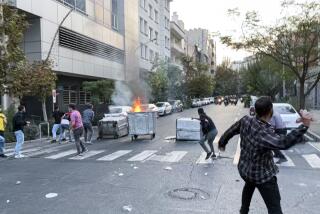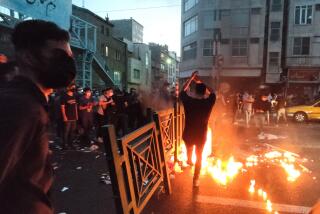The mullahs must go
- Share via
Since Iran’s controversial and disputed election, President Obama has been noticeably restrained in his reaction. He has flashed his empathy, saying on Tuesday that he was “appalled and outraged” by the regime’s brutality, but he has been equally emphatic about not being perceived as meddling in Iran’s internal affairs. Despite increasing political heat, even from Democrats and the usually adulatory U.S. media, Obama persists in his low-key approach, clinging to emotive generalizations.
But it is the president’s underlying policies that are wrong, not just his rhetoric. Saying that he does not want the “debate” inside Iran to be about the United States is disingenuous at best. Obama’s real objective is to launch negotiations with Iran over its nuclear program, in the belief that he can talk Iran out of its 20-year effort to acquire deliverable nuclear weapons. He said it during the 2008 campaign, during his inaugural address and repeatedly thereafter.
Viewed in the light of this near-religious obsession with negotiation, Obama’s reticence is entirely understandable: He does not want to jeopardize the chance to sit with the likes of Iranian supreme leader Ayatollah Ali Khamenei, President Mahmoud Ahmadinejad or the Islamic Revolutionary Guard.
In fact, everything we know about the regime indicates that Iran, and the Revolutionary Guard in particular, will never voluntarily give up its nuclear program, so Obama’s policy is doomed to failure. (Inevitably, of course, if negotiations start, Obama would change the definition of success to include accepting a “peaceful” Iranian uranium- enrichment program, which means Tehran would retain its “breakout” capability to quickly produce nuclear weapons -- but exploring this further Obama failure has to wait for another day.)
Accordingly, it is Obama’s policy errors, not his rhetorical ones, that should be opposed. Rhetoric itself is not policy but only the adjunct of policy, albeit often an important one. Obama’s reticence reflects his larger misjudgment -- the dangerous misconception that there is a negotiated solution to Iran’s nuclear threat that can satisfy both Iran and the United States.
Pursuing that objective is perilous for America, its allies and its friends -- in Europe, Israel and the Arab world alike. Moreover, Obama rarely mentions Iran’s continuing role as the world’s central banker for terrorist groups such as Hamas and Hezbollah, yet this is another threat that negotiation will not eliminate.
Obama’s policy, and that of the United States, should be the overthrow of the Islamic revolution of 1979. The massive resistance to the June 12 elections is just another fact supporting that conclusion.
The Tehran regime -- not just Ahmadinejad but the entire Islamic revolution superstructure -- is enormously unpopular for three major reasons. First, the regime’s economic mismanagement has brought the economy of a country rich in oil and natural gas to near-gridlock. Periodic but piecemeal strikes have been put down, but the prospect of a simultaneous, sustained, nationwide strike remains a potent threat
Second, Iran’s young people -- two-thirds of the population is under 30 -- know they could have a much freer life if they could only overturn the mullahs’ strict rule. The young are educated and sophisticated, and they know there are alternatives to Ayatollah Ruhollah Khomeini’s velayat-e faqih, the system of “guardianship of Islamic jurists” that imposes harsh Sharia law on Iran today.
Third, Iran is only about 50% Persian. Arabs, Baluchis, Azeris, Kurds and others resent the ethnic, political and religious discrimination they face constantly and have little or no love for the Islamic revolution.
Of course, these various sources of discontent are not entirely reinforcing, and are sometimes in conflict, which indicates how difficult it is for a purely internal Iranian opposition to coalesce. Had the U.S. and others over the last 30 years done more to help Iranian dissidents, overtly and covertly, we might be in a different place today. The question is whether we are prepared to do now what we should have been doing for some time.
To date at least, the Obama administration’s answer remains a resounding no. Obama wants negotiations with Tehran, not regime change. Given that the Revolutionary Guard and the hard-line mullahs -- and not the people -- are increasingly likely to be the short-term winners of the current Battle for Iran, supporters of regime change must now make longer-term plans.
We have missed a huge opportunity because of Obama’s error (and that of his predecessors), but the continuing threat of Iranian nuclear weapons and support for international terrorism make the imperative of regime change no less compelling. The Iranian people will continue their opposition no matter how inconvenient it is for Obama’s hoped-for negotiations. We should support them, and not just by rhetoric.
More to Read
Sign up for Essential California
The most important California stories and recommendations in your inbox every morning.
You may occasionally receive promotional content from the Los Angeles Times.










